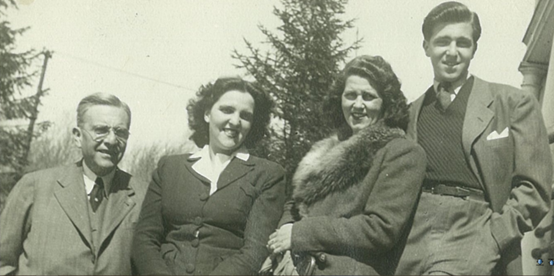Beyond a severely limited immigration quota kept to a bare minimum, fewer than a thousand Jewish refugees from Europe were admitted into the U.S. during World War II. In August 1944, they were brought on a single U.S. Liberty ship, then interned behind barbed wire on an old U.S. Army camp upstate New York until after the war had ended. That small lucky group included my father Ivo, his sister Mira, and their parents Otto and Ruza.

I was born in America in 1956, twelve years and a world away from that day on which my family and too few others so barely made it onto that one ship. All my adult life, I have tried to understand what it was like for them, or anyone in danger because of prejudice and hate. Not easy to do when you have had the luxury, as I have, of growing and living in safety.
A few weeks ago in Berlin, at a screening by the U.S. Embassy, I had the joy of meeting the team behind the new six-hour film, The U.S. and the Holocaust by American filmmakers Ken Burns, Lynn Novick, and Sarah Botstein. As a playwright, I have just finished telling another angle of that same story for the stage in my new play entitled 982.
Millions desperate for escape. Isolationists in the State Department, the America First Committee, figures like Charles Lindbergh and Henry Ford, all arguing Europe’s Jews should be left to fend for themselves. We know how that turned out. We know, too, the heroic parts of that American story. Together with our allies, charging Omaha Beach on D‑Day, pushing the Nazis from North Africa and the boot of Italy, helping rebuild Europe once the guns fell silent.
In film, on stage, and elsewhere, it’s time to reflect on a more nuanced, more complete recounting of America’s role in the Holocaust. What the country did, but also what it did not do.
In June 1940, Assistant Secretary of State Breckinridge Long, in charge of visas, wrote [edited for clarity]: “We can delay and effectively stop the number of immigrants into the United States by simply advising our consuls to put every obstacle in the way, and to resort to various administrative devices which would postpone and postpone and postpone the granting of visas.”
“Postpone” written three times, to make sure message received.
From now-Italy and Hungary to a reborn America First movement in the States, that same indifference again calcifying as would-be policy: “Do not give us your huddled masses yearning to breathe free. Let them wash upon the teeming shore. I lift my lamp beside the closed door.”
At Eleanor’s urging, President Roosevelt knew he had to do something, if only as a token gesture. So, even as no more than ten percent of approved (!) visas were issued, he also brought a mere 982 refugees, inviting them as his so-called “personal guests” to be detained behind wire in Oswego, N.Y., for the war’s duration. If not free, they were at least safe. After the war ended, then-President Truman granted them permission to stay and become naturalized Americans. Most had no homes, or families, to return to.
My father, having fled former Yugoslavia, only eleven-years old, grew to become a professor of diplomatic history at Princeton, Yale, and Stanford. He appears as a character in my play, where he reminds us, “We don’t study history to understand the past. We study it to understand today and prepare for tomorrow.”
A direct line connecting Romans, eager thumbs down at the Colosseum targeting Christians, Nazi rallies in Nuremberg targeting Jews, Srebrenica targeting Muslims, a torch-lit march in Charlottesville 2017. Red-eyed faces chanting, drooling in the light of those fires. All united by fear of the dreaded Other and a passion for hate.
In my play, my father’s character finds it easier to share his story with a young Black woman he’s just met than with me. Her own dad having been murdered on the street for no more than the color of his skin. “He wore his star on every inch of his body,” she tells him. When he confesses that he feels guilty, having been one of only 982 brought safely to America, she tells him, “Ivo, the fact you did survive means one can survive. And if one can survive means we will survive. So, there’s hope in your story.”
Ken Burns and his partners do a brilliant job telling the bigger part of America’s role in the story of the Holocaust. In my play, I’ve tried to focus on a small group of 982 who arrived from Europe to America labeled as ‘U.S. Military Casual Baggage’.
We think of war as a big story. But really, it’s so many smaller stories stitched together.
11,820 Total Views, 2 Views Today






